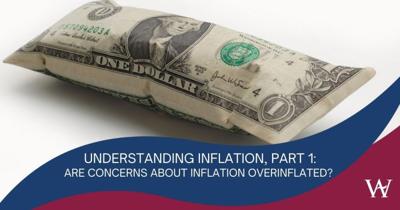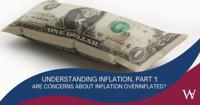Since the stock market has been doing pretty well lately, I suppose we’ve had to find something else to worry about. For many investors, that “something” is inflation.
Recent headlines have suggested it may be time to brace for higher inflation, or the rate at which your cash is losing its purchasing power over time. The Consumer Price Index (CPI) is our general measure of rising or falling prices, which in turn drives inflation rates up or down. Lately, the CPI has been on the rise. But before you read too much into the news, here are a few things to remember:
The Pandemic: Many of the inflation stats you’re seeing are based on comparing this year’s prices to last year’s, when we were still deep in a pandemic economy. This means what may seem like a substantive increase may be more of a radar blip. The Federal Reserve has expressed optimism that rising rates will settle back down as we (hopefully) return to relative normalcy.
Future Expectations: The Federal Reserve’s 10 Year Break-Even Inflation Rate is a common estimate of the market’s expected average annual inflation rate for the next 10 years. As of early July, that rate was 2.3%. That’s up from the 1.4% expectation from early July 2020, but it’s hardly eye-popping.
Degrees of Inflation: A little inflation is actually a good thing, spurring economic growth and reasonable interest rates for lenders and borrowers alike. A 2% annual inflation rate is typically considered a desirable norm for greasing the wheels of commerce, without destroying the working relationship between currencies and costs.
Explanations vs. Predictions: Just because we can explain why inflation has happened, doesn’t mean we can predict its future. There are simply too many economic, financial, political, social, global, and other variables that can throw off any predictions about the time, degree, and extent of future inflation.
For the sake of discussion, let’s say inflation does awaken with a roar after decades of relative slumber. What can you do to prepare? In summary, you must invest a portion of your wealth in the stock market to beat inflation. There are additional steps you can take if you’re a retiree on fixed income. I’ll explain all that next.
To read my past articles please visit insights.alliantwealth.com and select the InsideNoVa library. Online: alliantwealth.com E-mail: jfrisch@alliantwealth.com



(0) comments
Welcome to the discussion.
Log In
Keep it Clean. Please avoid obscene, vulgar, lewd, racist or sexually-oriented language.
PLEASE TURN OFF YOUR CAPS LOCK.
Don't Threaten. Threats of harming another person will not be tolerated.
Be Truthful. Don't knowingly lie about anyone or anything.
Be Nice. No racism, sexism or any sort of -ism that is degrading to another person.
Be Proactive. Use the 'Report' link on each comment to let us know of abusive posts.
Share with Us. We'd love to hear eyewitness accounts, the history behind an article.